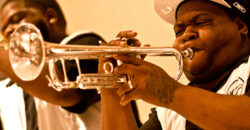Video
The Hot 8 Brass Band
As Told By Themselves
Published: April 4, 2016
Last Updated: October 2, 2019
 The following is excerpted from an oral history of the Hot 8 Brass Band recorded at the Louisiana Humanities Center and moderated by journalist Jason Berry.
The following is excerpted from an oral history of the Hot 8 Brass Band recorded at the Louisiana Humanities Center and moderated by journalist Jason Berry.
Bennie Pete on the origins of the Hot 8
In 1995 the Hot 8 started. In the summer of ’92, ’93, we’re in 10th grade at the time. We were all in the high school marching band at the time, so it was just about being competitive, marching in parades, marching in conventions. All of us went to the same high school when we started, Uptown on Freret [Street] at Alcee Fortier… Actually, I remember Jerome [Jones] was the leader of the band…. He said “Hey, man, we want you to be in our band, we’re starting a second line band.” I’m like “I don’t want to be in a second line band. For what?” He was like, “Well, you can get paid.” [laughs] I was like, “Well, when do I start?”
He said “Come today after band practice.” Me and Harry, a few other guys, we went. We used to practice in Shakespeare Park…. We would practice every day in the park after school. We did that for awhile. Around 1994, when most of us graduated…a few guys went on to college, a few guys got married, and we still wanted to be in it. So, there were four members left: me, Harry, Jerome, and Jacob Johnson…. Four of the guys from the High Steppers and four of the guys from the Looney Tunes—that’s what we were called then—we got together and we formed the Hot 8.
Bennie Pete on his influences as a tuba player
I would say Tuba Fats. Anthony Lacen. And Kirk Joseph, I liked how he played. I come to find out he was alumni from Fortier. I was like, wow. I really wanted to play like him because he went to the same high school. I had a relationship with Anthony. When I first really met him, his wife was sick at the time, and I was going through problems with my foot, and so we would always meet up—me and my mom, him and his wife—would always meet up at Charity Hospital because, y’know, the appointment was always on the same day. Fourteenth or whatever, if you go on the 14th, they keep you on that same day every month…. We were always talking, he was always inviting me the Quarter to come and hang out and learn some things from him. I would go, but I would never bring my horn. I was scared. I would listen, try to watch his fingers. He would cover his fingers up! I would just run away. I’d hang for a little while, and when he turned his head…. Cause he was always one who would put you on the spot. I always paid attention to him.
Terrell “Burger” Batiste on playing the first second line following Hurricane Katrina
It was important for us to keep in contact with each other. Me and Bennie was out in Atlanta, and we did our best to contact each other at least twice a day. The band was always together. We came from Atlanta to New Orleans to do that gig [the first second line after the levee failures] and it wasn’t hard to get in the city, but seeing the city at that time was real hard for us, after the disaster. We was happy to be around each other, because at that time we knew it was family that pulled us through. We’re like family. A lot of us don’t have brothers, so we bond very hard. That’s why we kept in touch with each other during that time. It was hard, but we feed off each other. If we’re enjoying it, that’s what gets us through. The people’s just the extra oomph, the push to put more into it. We try to have fun with everything we do to get through it. The hardest part is when the music stopped and we had to stand and look around.
Trumpeter Raymond Williams on Ellis Marsalis
Going into the summer of my junior year, I was in the NORD [New Orleans Recreation Department] summer program, which was at Booker T. Washington High School. I met some good trumpet players. The band director at Booker T. Washington, Walter Smith, he was very supportive…. He said, “You cats should audition for NOCCA [New Orleans Center for the Creative Arts]. You could get the opportunity to study with Ellis Marsalis, get some musical training.” That interested me….
It was pouring down raining that day, raining cats and dogs. We went to NOCCA to audition. I had to audition in front of Ellis Marsalis, which was very frightening. I didn’t really know who he was, but he was a big, gigantic guy, and I’m this little kid doing the audition in front of Ellis. He tried to test my ear on piano, different notes, and I’d fumble around on the trumpet trying to match it, take me about five, six, seven times to find a note. When it came to the scales, he would ask me to play major scales, minor scales, and I would play every scale he asked me to play. He said to me after the audition, “Raymond Williams, you passed the audition by the skin of your teeth.” [laughs] He said, “Your knowledge of scales got you into the program, but we have to work on your ear.” I said, “Alright.” At NOCCA, I was learning the music of Miles Davis, John Coltrane, Sonny Rollins, which is beautiful, it was the first time being exposed to that type of music. That’s what I wanted to do, be a modern jazz musician. At that time, Wynton Marsalis was there, Donald Harrison, Branford Marsalis, Terence Blanchard, those guys were my inspiration, role models. I wanted to follow in their footsteps.
A couple of years later, after I graduated from high school, while I was at Xavier University, I was getting my bebop chops together, I was getting pretty good. I said, man, I need to get some lessons, I want to get back with Ellis Marsalis. So I called him up, and said, “Mr. Marsalis, I would like to take some lessons with you.” We scheduled a time to see him—that’s when NOCCA was still on Perrier Street. When I got there, it was just Ellis and myself in the room. He had some progressions on the board he was playing. He asked me to play them, and I was stumbling over them, didn’t really know what it was. He said “That’s ‘Just a Closer Walk with Thee.’” I couldn’t really play it. He said, “What do you really want to do?” I said, “I know bebop.” I played this song “Half Nelson.” He said, “Alright, let’s play it.” He liked it, he said, “You sound real good. This is what I want you to do.” He admitted to me, he said, “I kinda feel bad that, at the time, I wasn’t thinking about teaching New Orleans music to the students here. It wasn’t until later on that I realized how important it was to teach it to the students while they’re young.” He didn’t even accept the money that I was going to pay him for the lesson…. He said, “Take that money and go buy yourself some records.” He said names like Fats Navarro, bebop artists, but also some Louis Armstrong stuff. He said at that time he was trying to get Wynton to listen to New Orleans music. He had sent him a lot of tapes and CDs.
Snare drummer Samuel “Lil Sammy” Cyrus on growing up in Treme
I was born and raised in the Treme area, 6th ward, Dumaine and Robertson. Stayed right across the street from Trombone Shorty, actually. We used to walk around the neighborhood all day with boxes, little scraps, poke holes in boxes, walk around the neighborhood playing music, faking like we playing something. [laughs] Then Troy came up and had all these instruments, broke horns, broke heads on drums, and we just started walking around the neighborhood with them, and then we just hooked up, Tuba Fats and some of the rest of the guys helped us out, some of the guys who played with the Lil’ Rascals…. We started getting the music under our belt, started listening to everybody, trying to get the music down, going in the Quarter and things like that.
My first gig, I was about six years old, traveling with Troy’s brother James Andrews in New York. We started playing gigs with James Andrews, me and my cousin Wayne, and then my whole life of playing music in the Treme area, we went to this program called the Louis Armstrong program, going to those classes, and learning the music. After that, I went on to middle school and Trombone Shorty had a little brass band, maybe five of us, his cousin Travis Andrews, Glen David Andrews, Troy, me, and my cousin Wayne. We was right across the street from each other, just walking around the park, playing music, things like that. Somehow the band just broke apart and I started playing with the Stooges. After that, I had the music down pat, hitting with Troy and James Andrews and the rest of them, Tuba Fats, Shannon Powell and all them.

The Hot 8 Brass Band at the Louisiana Humanities Center at Turners’ Hall on April 8, 2009. Photos by Taylor Smiley
Bennie Pete on the late Dinneral Shavers
Tell you the truth, after he died I really realized what his true role was, after he passed, cause it was really missing. He was very energetic. He wasn’t lazy by any means. He had a lot of energy, he was always pushing us to do things. We’d have two or three second lines per Sunday, he’d want us to have different songs every Sunday. “We gonna play ‘em, then we gonna learn these other three songs, then we gonna do this…” At practice, we’d have a week to practice. If we’d be laughing and joking, he’d be like “we gotta learn this, we gotta do this,” he always was pushing me, especially as a leader, holding me accountable for things.
He’s really the main reason why our first CD got out was because of him, because at that time I was working at Loyola, and he wasn’t working because he had time on his hands. We had been out like 10, almost 11 years, and we didn’t have a recording. That was one of the things—brass bands being competitive—that was one of the things Rebirth always put in our faces: “We got 10, 15 records.” Cause we’d catch ‘em at second lines and we’d give ‘em a run for their money, but we didn’t have a CD out and they always threw that in our face. We gonna go and record. We took the time out to record, but we didn’t even practice, we just went to the studio, told him we needed 8, 9 hours, and we just went song for song, we didn’t listen to them, we just ran it down. We had 15, 20 songs. You talking about a CD, we gonna have a CD. And that was Dinneral. After I got off of work, he’d have all that stuff out. “We could use that cover, we could use that one, I’m thinking about using this one, I got somebody drawing this.” He was always pushing.
